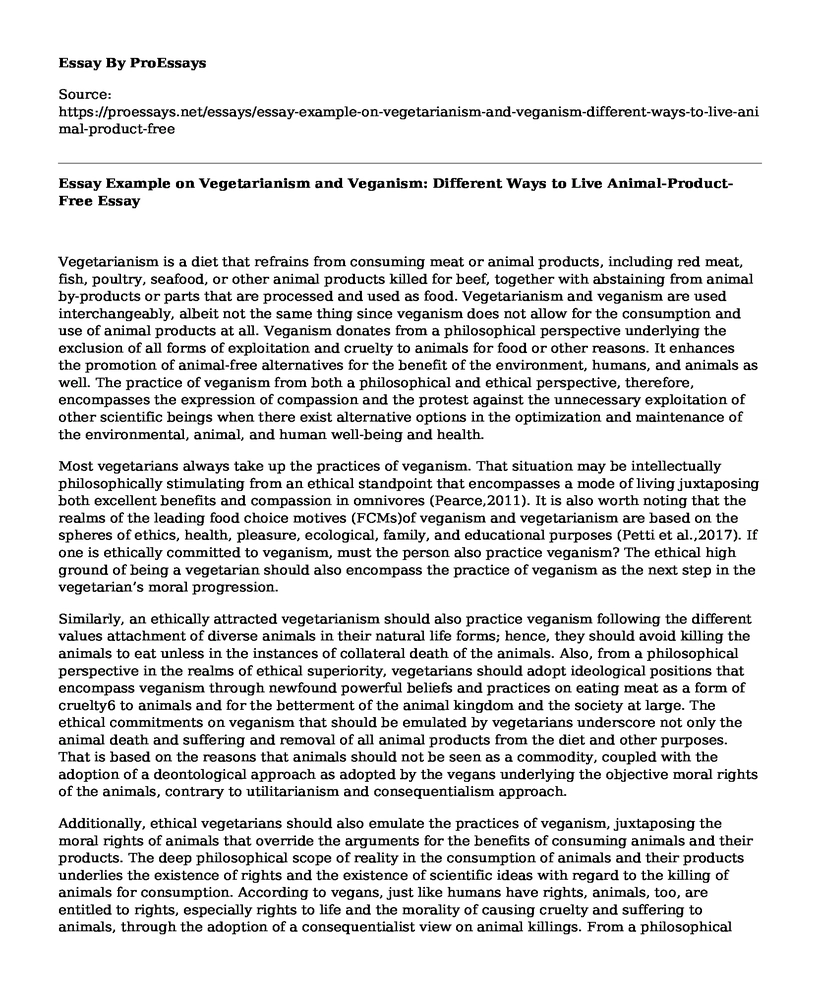Vegetarianism is a diet that refrains from consuming meat or animal products, including red meat, fish, poultry, seafood, or other animal products killed for beef, together with abstaining from animal by-products or parts that are processed and used as food. Vegetarianism and veganism are used interchangeably, albeit not the same thing since veganism does not allow for the consumption and use of animal products at all. Veganism donates from a philosophical perspective underlying the exclusion of all forms of exploitation and cruelty to animals for food or other reasons. It enhances the promotion of animal-free alternatives for the benefit of the environment, humans, and animals as well. The practice of veganism from both a philosophical and ethical perspective, therefore, encompasses the expression of compassion and the protest against the unnecessary exploitation of other scientific beings when there exist alternative options in the optimization and maintenance of the environmental, animal, and human well-being and health.
Most vegetarians always take up the practices of veganism. That situation may be intellectually philosophically stimulating from an ethical standpoint that encompasses a mode of living juxtaposing both excellent benefits and compassion in omnivores (Pearce,2011). It is also worth noting that the realms of the leading food choice motives (FCMs)of veganism and vegetarianism are based on the spheres of ethics, health, pleasure, ecological, family, and educational purposes (Petti et al.,2017). If one is ethically committed to veganism, must the person also practice veganism? The ethical high ground of being a vegetarian should also encompass the practice of veganism as the next step in the vegetarian’s moral progression.
Similarly, an ethically attracted vegetarianism should also practice veganism following the different values attachment of diverse animals in their natural life forms; hence, they should avoid killing the animals to eat unless in the instances of collateral death of the animals. Also, from a philosophical perspective in the realms of ethical superiority, vegetarians should adopt ideological positions that encompass veganism through newfound powerful beliefs and practices on eating meat as a form of cruelty6 to animals and for the betterment of the animal kingdom and the society at large. The ethical commitments on veganism that should be emulated by vegetarians underscore not only the animal death and suffering and removal of all animal products from the diet and other purposes. That is based on the reasons that animals should not be seen as a commodity, coupled with the adoption of a deontological approach as adopted by the vegans underlying the objective moral rights of the animals, contrary to utilitarianism and consequentialism approach.
Additionally, ethical vegetarians should also emulate the practices of veganism, juxtaposing the moral rights of animals that override the arguments for the benefits of consuming animals and their products. The deep philosophical scope of reality in the consumption of animals and their products underlies the existence of rights and the existence of scientific ideas with regard to the killing of animals for consumption. According to vegans, just like humans have rights, animals, too, are entitled to rights, especially rights to life and the morality of causing cruelty and suffering to animals, through the adoption of a consequentialist view on animal killings. From a philosophical and ethical perspective, the practices of veganism should be adhered to by ethical vegetarians following the objectivity, rights, and the protection of species and human’s moral duty to protect the animal species and the environment (Thames,2018).
Conclusion
However, there exist counterarguments on ethical veganism, citing that a vegan diet leads to more deaths of animals than in omnivorous consumption since most animals are killed for cropland and during harvesting and on plants that are eaten by vegans. Proponents of such arguments assert that vegans should stop feeding on plant products that most animals rely on for survival and instead feed on animals since animal meat is rich in protein and calories (Hoffman,2013). However, moral veganism asserts the notion of the need for the protection of animals instead of hurting and killing them for human consumption and their products. That is morally wrong as they also feel pain and have rights just as humans, and there exist other options for use as vegetables. There is, therefore, the need to fight against the spirit of cruelty and suffering with which animals are treated as true humanity in the moral perspective does not allow us to impose suffering on animals; hence, ethically committed vegetarians should also adhere to the practices of veganism.
References
Hoffman, P. (2013, February). The Ethical Arguments Against Ethical Veganism. Our HenHouse. Retrieved from https://www.ourhenhouse.org/2013/02/the-ethical-argumentsagainst-ethical-veganism/Pearce, J. (2011, August).
Vegetarians and Vegans -A Philosophical Look into Whether They Can Rightfully Adopt A Moral High Ground. A Tippling Philosopher. Retrieved fromhttps://skepticink.com/tippling/essays-and-papers/vegetarians-and-vegans-aphilosophicallook-into-whether-they-can-rightfully-adopt-a-moralPetti, A., Palmieri, B., Vadala, M, & Laurino, C. (2017, October).
Vegetarianism and Veganism:Not Only Benefits but also Gaps. A Review. Progress in Nutrition.19(3) :229-242.Retrieved from DOI: 10.23751/pn. v19i3.522
Thames, B. (2018). How Should one Live? An Introduction to Ethics and Moral Reasoning (3rded.). Phil Papers. Retrieved from https://content.ashford.edu.
Cite this page
Essay Example on Vegetarianism and Veganism: Different Ways to Live Animal-Product-Free. (2023, Aug 23). Retrieved from https://proessays.net/essays/essay-example-on-vegetarianism-and-veganism-different-ways-to-live-animal-product-free
If you are the original author of this essay and no longer wish to have it published on the ProEssays website, please click below to request its removal:
- Restrictive Eating Behaviors Are a Non-Weight-Based Marker of Severity in Anorexia Nervosa
- How Diet and Exercise Impact On the Mind? - Essay Sample
- Essay on Health Benefits of Organic Food and Counter Argument
- Plant-Based Diets - Essay Sample
- Vegan Diet is Better of Health - Argumentative Essay
- Essay Example on Exploring the Fast-Food Industry: From 1921 to Today
- Essay Example on Cooking: Preparing Meals with Ease and Care







